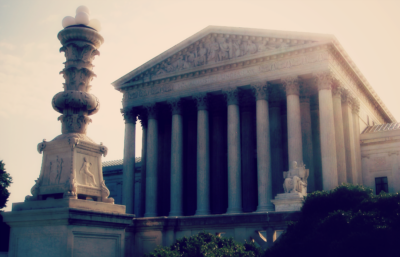Due Process and the Courts
What does the constitution say about due process?
The Fifth Amendment to the Constitution says clearly that no person shall be deprived of life, liberty, or property without the due process of law. Note that this says person, not citizen, and over the years the Supreme Court has consistently ruled that the Due Process Clause applies to all people in the United States.Do non-citizens have the right to due process in the U.S.?
Yes. The Constitution guarantees due process rights to all "persons," not just citizens. This means non-citizens, including undocumented immigrants, are entitled to fair treatment under the law. This includes the right to defend themselves in court. But recent Trump administration policies that speed up deportations and limit access to legal representation make it harder for non-citizens to get their fair day in court.- Access to legal representation Access to legal counsel is an essential part of our justice system and our democracy. In the criminal justice system, anyone facing even one day in jail gets a lawyer if they can't afford one. But immigrants facing deportation usually don't get that chance.The research is clear – the most effective way to ensure some level of due process for people navigating our complicated immigration system is for them to have trained attorney at their side. But Trump administration is now working to strip attorneys from as many people as possible, all in the name of increasing its deportation numbers. This attempt to eliminate basic due process will hurt people who already have few options.
- Fair day in court Due process guarantees that individuals have the opportunity to defend themselves in court. This includes non-citizens facing deportation.
Why is due process important?
We are seeing right now the importance of due process when it comes to President Trump's actions to carry out the so-called Alien Enemies Act, a 1798 wartime law that permits people to be deported outside of the normal framework of immigration law. President Trump has alleged that this law allows him to simply point at any person, declare them to be an alien enemy, and kick them out of the country without ever having a chance to see a judge. Thankfully, the Supreme Court said that is not true, and in a unanimous decision, ruled that people can challenge the Trump administration's invocation of the Alien Enemies Act. That is why due process is so important, because it means that no person can be rounded up and sent to another country without a chance to go to court and make the government prove their case.How is the American Immigration Council working to protect due process?
- We serve thousands of individuals in immigration detention centers through the Immigration Justice Campaign, our initiative with the American Immigration Lawyers Association. The Justice Campaign provides free legal services for immigrants who would otherwise have to navigate our complicated immigration system without a lawyer.
- We use the courts to demand a fair process for immigrants. Our litigation team is fighting back against the Trump administration’s blatant disregard for due process including filing a lawsuit challenging their illegal detention of immigrants in El Salvador’s notorious Terrorism Confinement Center (CECOT).

Federal Court Grants Nationwide Class Status in Suit to Protect Asylum Seekers
A federal court in Seattle has granted nationwide class action status to a case seeking to protect the rights of thousands of asylum seekers pursuing protection from persecution in their home countries. Read More

Asylum Free Zones in the U.S. Examined by Inter-American Commission
Entire jurisdictions in the United States have become so hostile to asylum seekers and their representatives that the U.S. government, and its immigration court system, is failing to deliver on its international and national obligation to protect them. The asylum-seekers who end up in one of these hostile jurisdictions, which… Read More

California District Court Says Immigrants Ability to Pay Should Influence Bond Decisions
Unlike in criminal court, where those charged with a crime often hire bail bondsmen and consequently only have to pay 10 percent of the total bail amount, immigrants detained by Immigration and Customs Enforcement (ICE) often have to pay the full amount of a bond because there are very… Read More

Supreme Court Considers Challenge to Detention of Immigrants Without Bond Hearings
The Supreme Court heard arguments this week in what may be the most important immigration case on its docket this fall, Jennings v. Rodriguez. The case, which began as a class action filed in California, raises important questions about whether the government has the authority to categorically deny certain… Read More

Judge Orders Border Patrol to Provide Short Term Detainees with Basic Necessities
A federal judge ordered the Border Patrol to immediately cease its practice of refusing to provide basic amenities to people detained in Border Patrol holding cells in Tucson, Arizona. The judge cited evidence that shows that detainees are kept in freezing holding cells—often called “hieleras” or “iceboxes” —for days… Read More

Judge Orders Border Patrol to Immediately Provide Short Term Detainees with Basic Necessities
A federal judge ordered the Border Patrol to immediately cease its practice of refusing to provide basic amenities to people detained in Border Patrol holding cells in Tucson, Arizona. The judge cited evidence that shows that detainees are kept in freezing holding cells—often called “hieleras” or “iceboxes” —for days… Read More

Judge Orders Border Patrol to Immediately Provide Short Term Detainees with Basic Necessities
A federal judge ordered the Border Patrol to immediately cease its practice of refusing to provide basic amenities to people detained in Border Patrol holding cells in Tucson, Arizona. The judge cited evidence that shows that detainees are kept in freezing holding cells—often called “hieleras” or “iceboxes” —for days… Read More

Jeff Sessions Nomination for Attorney General is Highly Concerning to Future of Immigration Policy
President-Elect Donald Trump has nominated, Senator Jefferson Beauregard Sessions III (R-AL) to serve as the nation’s next Attorney General. Senator Sessions has led the fight against immigration reform at every turn during his 20 years in the Senate. He has urged severe restrictions on visas, called for… Read More

Jeff Sessions Nominated to Serve as Attorney General
Alabama Senator Jeff Sessions will be nominated to serve as Attorney General in President-Elect Trump’s new administration. The following is a statement from Beth Werlin, Executive Director of the American Immigration Council. Read More
Make a contribution
Make a direct impact on the lives of immigrants.
